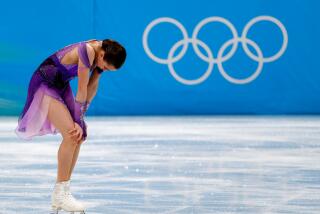Edwards Is Out of Games
- Share via
ATHENS — In a key test of strict new anti-doping rules Tuesday, U.S. sprinter Torri Edwards was ruled out of the 2004 Olympics, an arbitration panel upholding a two-year suspension imposed after she had tested positive for a banned stimulant.
The panel, from the Court of Arbitration for Sport, held Edwards, 27, responsible for taking glucose tablets laced with nikethamide at a meet in April in Martinique.
She had said she didn’t know the tablets contained the stimulant. The panel said she should have known and upheld the two-year ban, the typical sanction for a first doping offense.
Edwards, a graduate of Pomona High and USC, had been considered a medal contender. She had finished second in the 100 and third in the 200 at the U.S. Olympic trials. Her spot in the 100 will go to Gail Devers and her spot in the 200 to LaShaunte’a Moore.
Edwards’ attorney, Emmanuel Hudson, who runs the HSI track club in Southern California, could not be reached for comment. Edwards’ suspension will run until July 17, 2006.
The case was a major test of an aggressive new anti-doping stance for all Olympic sports.
Track and field’s worldwide governing body, the International Assn. of Athletics Federations, implemented the code March 1. Edwards took the glucose pills seven weeks later. Under the IAAF’s former anti-doping rules, she would have received only a public warning.
The arbitration panel rejected Edwards’ claim that the code’s standard ban of two years -- for a mistake, and a first offense at that -- was unduly harsh. She had claimed her act was “isolated, inadvertent, unknowing and unintentional.”
Under what’s called “strict liability,” however, an athlete is responsible for what’s in his or her system. The panel said she had been negligent, adding that every athlete had “an obligation and a duty ... to ensure that no prohibited substance enters his [or] her body, tissues and fluid.”
More to Read
Go beyond the scoreboard
Get the latest on L.A.'s teams in the daily Sports Report newsletter.
You may occasionally receive promotional content from the Los Angeles Times.






